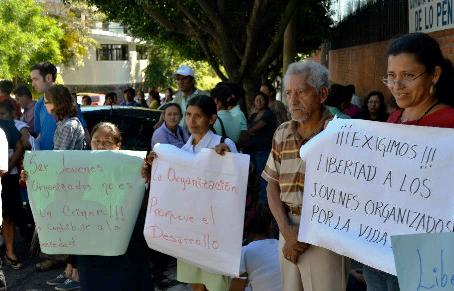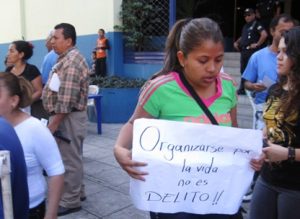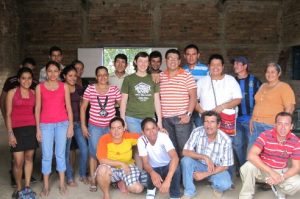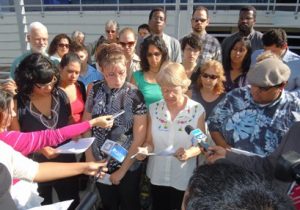Community Development Projects, International Meddling, Sister Cities
Solidarity Organizations & MPR-12 Demand Release Of Young Community Leaders
January 29th, 2013
On January 28th, 60 members of the Movement of Popular Resistance (MPR-12), international solidarity organizations and residents of the urban communities Santa Cecilia and El Progreso 3 gathered in front of the Specialized Chamber of Organized Crime more than month after the raid on Santa Ceclia and El Progreso 3 that resulted in the unfair arrest and imprisonment of 8 young community leaders.
The goal of the rally and press conference was to bring more attention to the case of the arrested youths and to police harassment and repression that is a daily reality in the marginalized urban communities of El Salvador.
The wife of one arrested youth and a mother with two son’s in jail, spoke about the injustice of having their organized, responsible loved one’s imprisoned in such inhuman conditions. Mirna Perla, a former member of the Supreme Court, has also been helping the community with this struggle, spoke about the very flawed Special court system that was established with the passage of the so-called “Anti-Terrorist Law” in 2006. The “Anti- Terrorist Law” was the same law that the administration of President Tony Saca tried to use against the “Suchitoto 14“, the CRIPDES folks captured on their way to a water protest in 2007. As the MPR-12 emphatically stated in their press release, “this law violates the constitution and the communities’ freedom of association and right to work for peace, security and tranquility”.
Carlos Vasquez, a social promoter who lives in the area and worked with the arrested youth also expressed frustration with the government’s inconsistent efforts to reduce violence. Vasquez said, “while the government is promoting ‘Sanctuary Cities’ as part of the official gang truce, they are stepping on the processes of peace that we have been doing in our own for years. Because for us peace is not just being free from gang violence, but peace is also having access to dignified housing, basic social services and educational and recreational opportunities for our youth.”
Although most Salvadoran press did not dain to cover the event, the rally did achieve its goal of pressuring the Specialized Chamber of Organized Crime to move the case of the youths forward. A commission composed of community representatives and a representative of the international community was allowed to meet with employees of the Specialized Chamber. At the meeting, it came to light that the officials didn’t have the ample evidence documenting the organizational, educational and occupational backgrounds of the arrested young men. Somehow this information never got from the Attorney General’s office to the Chamber. Dr. Perla retrieved the information and delivered it to the Chamber herself. Thanks to the pressure of the communities, the MPR-12 and international solidarity organizations like Sister Cities, hopefully this case will continue to move forward and we will soon seen the day when these innocent youth are released.
PRESS RELEASE
Organizing is not a Crime!
The International Community Demands the Release of Young Community Organizers
For decades the organizations U.S. El Salvador Sister Cities, the SHARE Foundation, the Committee in Solidarity with the People of El Salvador (CISPES), Voices on the Border and Red Uniendo Manos El Salvador have supported the social movement in El Salvador in its efforts to construct a democratic and just country. We are here today in solidarity with the Salvadoran people, demanding justice in the case of ten young community organizers who have been targeted for their political activism, charged with Illicit Association and thrown in jail.
On December 12, 2012, 14 young people were arrested in the adjoining communities of El Progreso 3 and Santa Cecilia in the northeastern part of San Salvador. Police from the Anti-Gang Unit stormed the community in the middle of night, going home to home, trampling down doors and pulling young people from a community center. The police claimed that the goal of the raid was to arrest suspected gang members, but 8 young community leaders were also apprehended, while their terrified families and neighbors looked on. The students were taken directly to jail, charged with illicit association, and thrown into crowded cells already bursting with accused criminals awaiting trial.
More than a month after the raid we are here in front of the Specialized Chamber of Organized Crime with members of the Network of Communities for Life and the Movement of Popular Resistance-October 12 (the MPR-12), an alliance of community organizations and unions, demanding justice for these wrongly-accused youth and for all marginalized communities being terrorized by a police force funded in large part by the US government.
The youth that were arrested were not gang members, they are young people actively working to improve their community, organizing popular education schools, soccer tournaments, and health campaigns in the community, and working with their neighbors on infrastructure projects in which the municipal government declined to invest. The police who have targeted the community accuse these youths of participating in gang activity, citing their organizing work as evidence against them. But what these young men were doing was precisely the type of work that can actually reduce violence and discourage youth from joining gangs, work that the municipal government of San Salvador has refused to do in the capital’s marginalized communities. Two of the main organizers from the community escaped arrest, and have been in hiding since December, putting at risk scholarships they were awarded to start their university studies.
As organizations based in the United States, it is troubling to see how the U.S. intervention in El Salvador’s security policy – through the US war on Drugs and gangs in Central America – has contributed to this climate of fear in marginalized urban communities. In communities like El Progreso 3 and Santa Cecilia young people like these arrested youth are spied on and harassed by a police force that receives large amounts of funding and training from the United States, even as they try to organize other youth to contribute to their communities instead of joining gangs. The end result of raids like this is a sense of terror and powerlessness that discourages people from organizing in their communities and actively participating in their country’s democratic process.
While the United States government claims to be committed to helping the Salvadoran government train professional police that respect human rights through U.S.-administered International Law Enforcement Academy (ILEA), many international organizations have documented an increase in human rights violations since the ILEA opened in 2005. Cases like the December 12th raid on El Progreso 3, perpetrated by a police force that receives training at the ILEA and whose director is a graduate of the U.S. School of the Americas, seriously call into question the commitment of the U.S. and its institutions like the ILEA and the School of the Americas, to making El Salvador a safer and more just country.
This case also illustrates the dysfunction of the specialized court system, in which ILEA-trained judges try those suspected of being involved in organized crime or gangs. Under this specialized system, the police need very little, or even no, evidence to charge suspects with illicit association, creating a system rife with false arrests and imprisonments. In their first hearing in December, neither the youth from El Progreso nor their lawyers were allowed to present evidence in their defense, so these innocent young men have endured yet another month of inhumane incarceration…The process ahead of them could stretch into six months or even a year, since the attorney general’s office can ask repeatedly for more time to find incriminating evidence. Meanwhile, these youth are at risk of losing their jobs and educational opportunities, as are their family members who have to devote time and resources to bringing their sons food and other basic necessities every week.
Since the end of the Civil War, the people of El Salvador have made great advances towards building a more just and democratic society. It is extremely troubling to continue to see the police terrorizing communities and instilling fear in social movement organizers with the funding, training and support of our country’s government.
Therefore, we stand in solidarity with our allies and partners in El Salvador, and reiterate their call for the Specialized Court System, the Attorney General of the Republic and the Minister of Justice to:
- Drop the fraudulent charges against the ten young leaders from El Progreso and Santa Cecilia and release them from police custody
- Stop the repression of young organizers in the urban marginalized communities of El Salvador
- Investigate the links between the young men’s political and community organizing and their targeted persecution by the police
We also demand that the U.S. Embassy, in representation of our own government:
- Close the ILEA, as it represents US intervention in El Salvador’s internal security policy
- Stop funding security policies that increase repression and militarization, and instead support the people of El Salvador’s sovereign efforts to resolve the social and economic inequalities and the climate of impunity that have produced high levels of violence in the country
Signed:
U.S. El Salvador Sister Cities Voices on the Border
The SHARE Foundation Red Uniendo Manos de El Salvador
The Committee in Solidarity with the People of El Salvador




